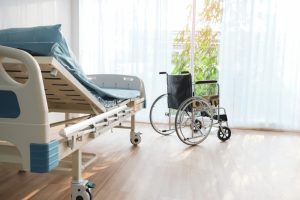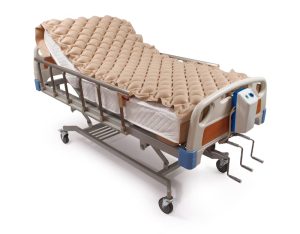 Bedsores are also known as decubitus ulcers or pressure ulcers. They can happen when an individual is immobile. An ulcer develops on the areas of the skin that receive pressure between a bone and the surface where the patient is resting. This pressure reduces the blood supply to the area and increases the risk of tissue death. A sore can start to form when the blood supply is cut off from the skin for more than two or three hours. The area will first look red and be painful.
Bedsores are also known as decubitus ulcers or pressure ulcers. They can happen when an individual is immobile. An ulcer develops on the areas of the skin that receive pressure between a bone and the surface where the patient is resting. This pressure reduces the blood supply to the area and increases the risk of tissue death. A sore can start to form when the blood supply is cut off from the skin for more than two or three hours. The area will first look red and be painful.
Eventually, it turns purple and can break open. Initially, a bedsore may be shallow but left untreated, and it can extend into the muscle and down to the bone. These areas can become infected. Once bedsores develop, they are very slow to heal.
Factors That Affect Bedsores In Nursing Home Patients
Bedsores can begin forming within two to three hours, but several factors affect the speed at which they develop.
 Surface: The harder the surface, the more pressure is placed on the skin and underlying structures. The type of mattress or cushion on a wheelchair makes a difference.
Surface: The harder the surface, the more pressure is placed on the skin and underlying structures. The type of mattress or cushion on a wheelchair makes a difference.
Age: Older adults have thinner skin, which makes them more susceptible to bedsores. They also have less natural cushioning over the bone and often have poor nutrition.
Malnutrition and dehydration: With muscle atrophy and wasting, the fat and muscle loss reduce the protection.
Urine or fecal incontinence: If the skin stays moist, it’s more likely to break down. Patients who are incontinent and are not changed frequently can have an increased risk of serious local infections or systemic complications from a pressure sore.
Vascular disease: Any disease that affects the vascular system and circulation can reduce blood flow to the area where sores may develop and increase the risk of tissue damage. This includes peripheral vascular disease, diabetes, and smoking.
Pain perception: Individuals with a loss of sensation will not be aware if they need to change position. This includes individuals who have a spinal cord injury or have reduced pain perception because of age.
What Are the Symptoms of Bedsores and How Are They Treated?
Bedsores begin with a reddened area that can feel warm to the touch. When they are left untreated, they progress through four stages:
Stage 1: The person may complain that the area itches, hurts, or burns. This is caused by tissue death, which makes the skin feel warm. Light-colored skin turns red and dark skin has a blue or purple tint. While the damage looks superficial, a Stage 1 ulcer can go deep and must be treated immediately.
Stage 2: The area may have a blister or an open sore and cause the individual significant pain.
Stage 3: The damage below the skin surface is more evident, and the area can have a crater-like appearance.
Stage 4: A large wound will be present, and muscle, joints, tendons, and bone may be visible. There’s a significant risk for infection at this stage that can become systemic and life-threatening.
Treatment for bedsores is usually managed by the wound care team and will be based on the severity of the condition. Once the skin is broken, treatment can become more difficult. Initially, it is vital that pressure is removed from the affected area and the remaining bony prominences are protected.
When the wound is open, it may be treated with medicated gauze and must be kept clean. Pressure sores are also treated with appropriate good nutrition, and negative pressure wound therapy may be initiated. If there are signs of infection, the wound team will recommend antibiotics. Pressure sores and bedsores can take months and sometimes years to heal.
Call Us If You Suspect Nursing Home Abuse or Caregiver Neglect
Bed sores are preventable with good care. The skin should be inspected every day, with particular attention paid to bony areas. The Centers for Medicare and Medicaid Services consider reducing pressure ulcers a priority for quality improvement organizations, which are groups dedicated to improving health quality for Medicare recipients.
In some cases, bed sores are difficult to prevent, but they should always be identified early and treated. If you believe your loved one developed bedsores due to nursing home abuse or caregiver neglect, call the nursing home abuse attorneys of Karlin, Fleisher & Falkenberg, LLC in Chicago today.
Your decision to place your loved one in a nursing home is a complicated and difficult one for your family. Any type of abuse or neglect is a breach of your trust.
Our attorneys have the experience, track record, and reputation you are looking for in an experienced legal team who can protect your rights and the rights of your loved one. Talk to an experienced nursing home abuse attorney from the Chicago offices of Karlin, Fleisher & Falkenberg, LLC by calling 312-346-8620 today for your confidential consultation.
